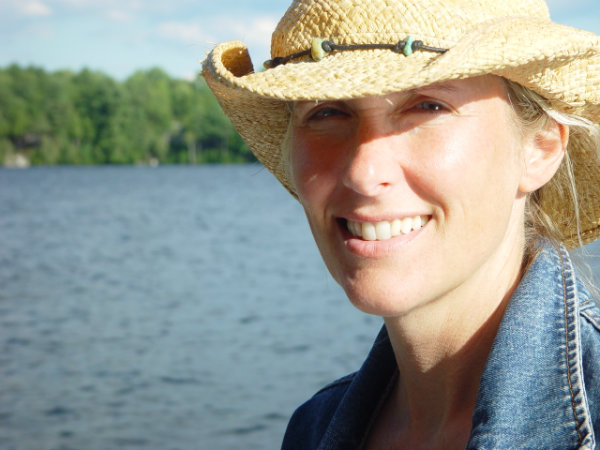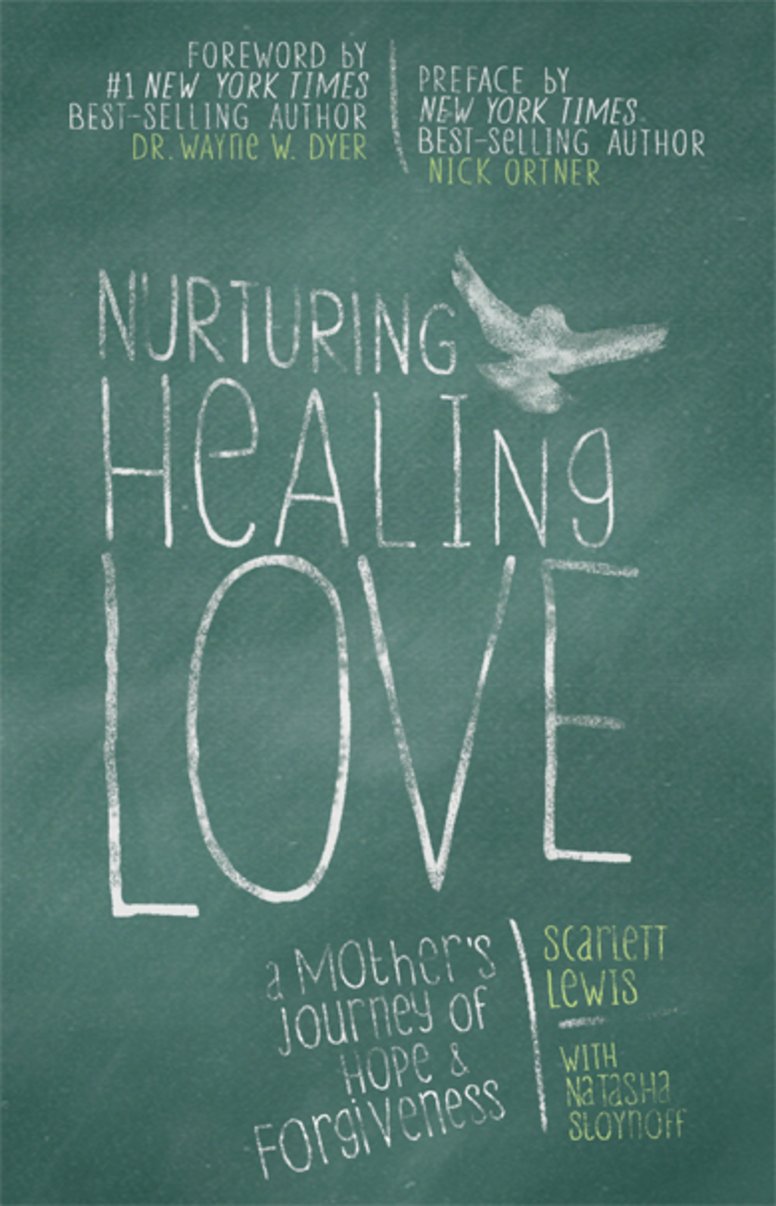Blog
Nurturing Healing Love: An Interview with Scarlett Lewis
by Jamie
Author Q & A + Biography & Memoir / December 13, 2013
I want to provide perspective to kids and to the whole world that if I can choose to forgive Adam, then you can certainly look into your own life and choose to forgive.
On December 14, 2012, Scarlett Lewis lost her six year old son Jesse at the Sandy Hook Elementary School massacre. Following Jesse's death, Scarlett went on an unexpected journey, inspired by a simple three-word message her son had scrawled on their kitchen chalkboard shortly before he died: ‘Norurting Helin Love’ (Nurturing Healing Love).
Even in her unimaginable grief, Scarlett drew courage from Jesse’s words and came to understand the power of forgiveness, even for Adam Lanza, the man who killed her son. Scarlett founded the Jesse Lewis Choose Love Foundation to develop programs to teach children about the power each of us has to change our thoughts and choose a life without fear and hate. She also now works with the Seeds of Empathy program, which is well known in Canadian schools.
On the day of the massacre, everyone had the same two questions: How could something like this happen? What can we do to keep it from happening again?
In an extended interview last week by telephone, Scarlett answered these essential questions and more.
It's been incredibly difficult nearing the anniversary, but being able to talk to people because they actually care—I've seen and felt the compassion from day one—is an amazing gift.
Jamie: First of all, I just wanted to say all of our hearts and prayers go out to you and to the other families of Sandy Hook. The events of last year are still so vivid in our minds. I wanted to offer our condolences.
Scarlett: Thank you. I very much appreciate that.
Jamie: I was wondering if this attention around the anniversary causes you more pain, or do you actually find solace in the fact that the world will be focusing on it?
Scarlett: December 14th was the third worst mass shooting in America's history, but it was actually the greatest day of compassion that the world has ever seen, in my eyes. And that's true authentic compassion, which is when someone feels someone's pain, empathizes with someone. The world came together to support us, and I can say that because I was the recipient of that compassion. I started the Jesse Lewis Choose Love Foundation to keep that momentum going.
It's been incredibly difficult nearing the anniversary, but being able to talk to people because they actually care—I've seen and felt the compassion from day one—is an amazing gift and I want to spread Jesse's message of nurturing, healing, love, so I appreciate any opportunity that I get.
Jamie: I think one of the most powerful moments in book is actually your description about survivors of the genocide in Rwanda reaching out to you.
Scarlett: It was a profoundly life changing experience to have someone from another country, another culture, reach out to express their condolences. Their message was so incredibly powerful because we weren't in touch personally with anyone who really understood what we were going through, except for the other families, and early on we weren't really in touch with them. For someone who had suffered something similar, actually even greater, to take the time and effort to reach out to us was a huge gift, and it was life changing. I mean, that really started our healing process.

Jamie: I was thinking about your own faith and something that Dr. Laura Asher writes in the book: "Grieving is a sacred act, you must respect it and treat it as such." Are there ways to deepen the sacred aspect of grieving as a culture? Are there things that you've learned that you could pass on to our readers?
Scarlett: Well first of all, we don't acknowledge death and dying in our culture. I mean it happens, but we don’t talk about it unless it happens. We don’t teach anything about it in school; we don't prepare ourselves in any way for death and dying. And of course everyone is going to die and it's a natural part of life. There's so much shrouded mystery around it, and it's really not a mysterious thing. I really think that it would be helpful if we talked about it. But it's difficult. Loss of any kind is difficult.
I do believe that grieving is sacred. It's a time when personally I felt very close to Jesse. Of course I wanted his physical body here with me, but I did feel very close spiritually to him. I had to work on my trauma before I could actually grieve. And even the fact that Dr. Laura framed it like that to me—you know, “grieving is a sacred act”—her just setting out that intention, and me being open minded, just being bewildered and not having any expectation of what it would be like, I accepted what she said and it became a sacred act for me. And of course when you don't think that there is an end to your spirit and you believe that your spirit goes on—that you will be reunited at one point with your loved one—that is definitely a comforting feeling.
I feel so connected with the world because I know that they are grieving with me. I know that because countless people have told me in the most beautiful ways. They're mourning with me.
Jamie: One of the things that touched me was how generous you were with family pictures in the book—the image of Jesse in the bathtub will speak to the heart of anyone who has a six-year-old boy. Like when you talk about his scent and keeping his clothes close to you, the photos allow us to enter a little bit into your grieving process.
Scarlett: Well you know, I feel so connected with the world because I know that they are grieving with me. I know that because countless people have told me in the most beautiful ways. They're mourning with me. They're supporting, they're sending their love and they've created these beautiful handmade gifts.
I wanted to give them insight into his life—to offer them a glimpse of this beautiful, precious young boy… to offer a glimpse into his life. I wanted them to know him, because they're grieving him but they never had the pleasure of knowing him. I wanted to give the reader that as well.
Jamie: You’ve said you ask yourself the same two questions that everyone asked that day: "How could something like this have happened?" And "what can I do to keep it from happening again?"
Scarlett: Some parents thought that it was guns. I personally saw the situation and thought that the whole tragedy started at some point with an angry thought in Adam Lanza's head. I pictured him as a young boy with an angry thought at some point, and I pictured him kind of stewing in this anger because he didn't have the tools nor the nurturing environment to be able to handle this emotion—which is totally normal when you have the tools to deal with it, but he didn't. And so at some point he tried to get relief from this horrible feeling of anger by blaming someone else. He blamed his parents, he blamed his classmates, he blamed his brother, he blamed someone. And when he did that, he became a victim. When he blamed somebody else for what he was feeling, he gave away all of his personal power—he's a victim and powerless to change his situation. Prolonged victimization leads to rage, and rage creates these acts of violence.
On December 14th the world came together in the greatest show of compassion in my mind that mankind has ever known.
I've gone in recently and talked to schools about forgiveness, and kids raise their hands and say, "What is forgiveness?" Well that's a great question. You know, we don't talk about all the aspects of forgiveness. "How long does forgiveness take?" What a great question, you know?
I think what I'm trying to do also is provide perspective—like the Rwandans provided perspective to me. If I can choose to forgive Adam, then you can look into your own life and choose to forgive—whatever's holding you back, whatever person or thing has caused you pain and is leaching your personal power from you.
We are all on planet Earth together, and our reason for being here and the way that we are going to survive is if we help each other. We're all in this together; we're all one. There is no separateness and we just need to realize that. On December 14th the world came together in the greatest show of compassion in my mind that mankind has ever known. I want to keep that momentum moving forward with the foundation.
Jamie: You mentioned in the book how proud you are of Jesse. I just want to end here by saying he must be extremely proud of you.
Scarlett: I feel so blessed to carry on the torch that Jesse has passed to me and to be able to teach through his example of bravery. A lot of his actions in his final moments saved his friends’ lives—nine of them. I use that example because it takes bravery to make the right choices. Choosing gratitude, choosing forgiveness, choosing compassion—it takes bravery to do that. It's not always the easiest thing to do. Sometimes it takes bravery to be kind to someone. Sometimes it takes bravery to be truthful and honest. If a six-year-old can stand up to a mentally deranged shooter at the other end of a semi-automatic weapon and choose that moment to save his friends’ lives, then we can make the right choices in our lives. We can choose truth and honesty. We can choose gratitude, forgiveness, and compassion. And we can all have a role in making this a better world.
Jamie: Thank you.
Scarlett: Thank you very much Jamie. I appreciate the opportunity.
Jamie: It’s been a great honour.

